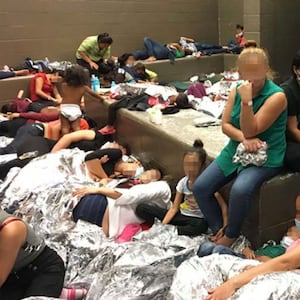For the past two weeks, Americans have debated whether the notoriously cramped and dirty detention centers on the southern border can be called “concentration camps.” For at least one Holocaust survivor, the answer is a resounding yes.
Ruth Bloch was 17 years old when she was separated from her family. While living in Holland in 1942, her father, mother, and brother were arrested and sent to concentration camps, where they were eventually killed. Bloch remained in Holland working as a seamstress at a fur factory, sewing fur-lined coats for German troops. She was eventually sent to Vught concentration camp in Holland in 1943, before being eventually transported to Auschwitz.
Now, at 93, she told The Daily Beast that she looks back at that time and can relate to the thousands of migrants, including small children, being held at camps after crossing the border into the U.S. to seek refuge.
“I feel because I have been in a concentration camp, I do understand that this is beyond human behavior. It’s because I know from my own experience what it means,” she said. “It means you are not allowed to think, and you’re always under the thumb of the authorities, the ones in power.”
Over the past several months, the number of migrants crossing the border has surged—according to U.S. Border patrol, 132,887 migrants, including 11,507 unaccompanied children, were apprehended at the border in May, the highest since 2006.
But the resources to handle the detained migrants are severely lacking. In a report by the Department of Homeland Security’s independent watchdog, “dangerous overcrowding” was observed inside the camps, and children lacked access to shower facilities, clean clothes, and hot meals.
When a team of lawyers visited a Customs and Border Protection facility in Clint, Texas last month, they reported unsanitary conditions and lack of basic toiletries like soap and toothpaste. Some children were left to care for themselves and others, including babies. Children were “incredibly sad and being traumatized,” according to a lawyer who visited the Clint site.
When Rep. Alexandria Ocasio-Cortez (D-NY) called the detention centers “concentration camps on our southern border,” she was met with pushback from Republicans as well as the U.S. Holocaust Memorial Museum, which claimed the analogy diminished the memory of those lost during the Holocaust. But a growing number of Holocaust and genocide experts have signed an open letter supporting the congresswoman, urging the museum to retract their statement.
Asked whether she found the comparison offensive, Bloch said: “No, I identify.”
Bloch said the conditions reported at the border camps sound painfully similar to her own. “It’s the same conditions I lived through—we never had soap, but we had water, cold water, and not necessarily a shower. No toilet paper. It was inhuman.”
“[In concentration camps] people have no control over their lives,” she continued. “You have to go to sleep when the light goes out, you have to eat when they want you to eat. You can’t express your own thoughts, because you might get penalized for that.”
Bloch said migrants today and Jews during World War II faced the same stark choice: Leave and face great danger, or stay and die.
“The people coming here now come out of desperation because they cannot live where they were born. It’s either to live or not to live,” she said. “[Back then], many parents sent their children before they sent themselves, into a different country if it was possible. Everybody tried. I think anyone like me who has gone through the Holocaust should know that these people have the exact same history.”
While she was sent to the concentration camps and denied opportunities because of her Jewish identity, the migrants today are also denied asylum because of their background, Bloch said.
“It’s mainly because of their color and where they’re coming from. But as a rule, humans are not very nice. People like to always look down on somebody else,” she said. “Instead of when you look down to pull that person up, they shove them down more. They don’t want to identify as human beings with those people and that’s a bad attitude. But it’s a human thing.”
And for the children held in the camps, Bloch said the United States is shutting the door on a generation who will eventually lose hope in the American dream.
“What you hear of the people in these camps, the kids have to take care of themselves, under the guards who watch them. There is no love,” she lamented. “What will become of them, I don’t know. If they’re lucky, they can spend a normal life, but I doubt it. It depends on how long they are in this situation. It will change their lives.”
After the Holocaust, Bloch met her husband, and they moved to Amsterdam, but quickly realized there was nothing left for them there.
“My family didn’t come back, and we felt whomever we knew, all of these people were not there anymore. There was nothing that held you. There was no family, there was nothing. So we said, let’s start anew and let’s go to America,” she recounted.
They arrived in the U.S. in 1948 and started an antique-dealing business. While thinking of how she was received at the time, she grew emotional.
“I was happy to come to America, and I was welcomed to America and I gave back to America by being productive, and I think these people should have the same right, who don’t have the chance to ever get it,” she said. “They come with nothing—from nothing, to nothing.”







